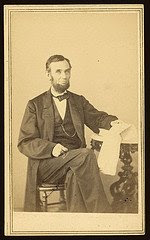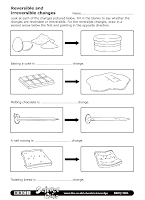
I'm reading Dorothy Kearns Goodwin's outstanding book,
Team of Rivals and I was struck how Lincoln had a handle on so many 21st Century Learning Skills. How did he do that without an iPhone and a virtual social network?
Accountability and Adaptability—Exercising personal responsibility and flexibility in personal, workplace, and community contexts; setting and meeting high standards and goals for one's self and others; tolerating ambiguity
It seems that everyone who observed Lincoln, from his time as a lawyer on the circuit, to his early political endeavors, right up to the Presidency, came away with similar reactions. He was a man of high character, immense skill, and shrewd maneuvering. In terms of ambiguity, his handling of the slavery/union issue on the verge of the 1860 election is a classic example of taking a nuanced approach to leadership, somehow bringing a coalition of Northern Republicans and Democrats to his side without overwhelming the border states who were constantly on the brink of secession.
Communication Skills—Understanding, managing, and creating effective oral, written, and multimedia communication in a variety of forms and contexts
I hear Abe was a pretty good public speaker. Some of you might have heard of the Second Inaugural Address and the
Gettysburg Address or maybe the debates with Stephen Douglas. Now, granted he did not use an LCD projector to throw up some PowerPoint, but he gets high marks for hitting that word effective on the rubric, no matter what the medium. His folksy methods belied his careful research and deep insights. I think it's the greatest compliment of a speaker that he is able to make the complex simple and Lincoln did so with good humor and clear thinking.
Creativity and Intellectual Curiosity—Developing, implementing, and communicating new ideas to others; staying open and responsive to new and diverse perspectives
Lincoln was faced with the challenge of preserving the union while the specter of slavery was being debated on many fronts. Somehow, he was able to craft a direction that was forward thinking, yet continuously revised as events changed. He was careful to integrate the intent of the Founding Fathers within the political and social upheaval of his day.
Critical Thinking and Systems Thinking—Exercising sound reasoning in understanding and making complex choices; understanding the interconnections among systems
At the outset of conflict, the South was sending overtures to England for support. Secretary of State Seward was incensed and drafted a threatening and menacing letter to Great Britain to cease and desist. Lincoln was able to see the repercussions of such a harsh tone and softened the language of the letter, then encouraged the ambassador to make sure it was read to no one, but only shared the general ideas with the English. The result was that England remained neutral, and the French followed suit, avoiding an early imbalance of power that would have weakened the North's chances for success.
Information and Media Literacy Skills—Analyzing, accessing, managing, integrating, evaluating, and creating information in a variety of forms and media
Lincoln was able to take in the information from various fronts and sources, evaluate those items that merited the highest priority and craft a coherent policy, then getting that information out to the people in a timely fashion. Now, granted he relied on horse drawn couriers (as the telegraph lines around Washington D.C. were sabotaged by the South), but he used the technology of his day with great effect. The substance of his message won the hearts and minds of his constituents.
Interpersonal and Collaborative Skills—Demonstrating teamwork and leadership; adapting to varied roles and responsibilities; working productively with others; exercising empathy; respecting diverse perspectives
Off the charts. The whole premise of this books is that Lincoln wisely sought to include his presidential rivals on his team so that the best and brightest were part of the cabinet. The manner in which he wooed these men, then skillfully kept everyone placated while melding diverse opinions was what made him truly remarkable. His greatest quality was his magnanimity and humility. He never took offense, even though he was surrounded by some ultra ambitious politicians who felt they were more worthy of the office that he was. You never heard him say something like, "I won, so you need to do what I say".
Problem Identification, Formulation, and Solution—Ability to frame, analyze, and solve problems
Abe faced problems unlike any of us have ever seen. No sooner had he entered the White House, but he was faced with the decision to fortify Form Sumter in South Carolina or allow the Confederates to take it over. He finally decided to send in fortifications, delicately balancing the concerns of the border states, who were sitting on the fence of secession.
Self-Direction—Monitoring one's own understanding and learning needs; locating appropriate resources; transferring learning from one domain to another
Lincolns was self taught, with a formal education that didn't amount to more than a year of school and he never set foot in a college or university. However he was an avid reader who constantly sought to acquire books to feed his fertile mind. His lack of formal support probably spurred him on to devour learning any way he could get it. I think he had one of those Personal Learning Networks (PLN) all these tweeters are talking about.
Social Responsibility—Acting responsibly with the interests of the larger community in mind; demonstrating ethical behavior in personal, workplace, and community contexts
I'm sure there are not many 21st century politicians who can lay claim to this skill. Mr. Lincoln was dedicated to the preservation of the Union and felt that his generation was given a sacred task of furthering the initial intentions of the Founding Fathers by doing whatever was necessary to prove that this grand experiment in democracy would not fail.
Now, don't get me wrong. I want our students to be skillful in the use of 21st century technology. I want them to learn to use social networking and digital story telling to its greatest effect, however I still see way too many horrendous PowerPoint slide decks that teachers think is cutting edge, when it's just full of shabby research and shallow thinking. The habits of mind that Mr. Lincoln had were obviously pretty good for both the 19th and 21st century and they will serve as excellent standards for our little learners of today.

 ization. It's imperative to keep one's eyes on the ultimate goal and work persistently toward that end expecting that the focused labor will produce the desired results. You might even consider a little back flip to celebrate when you finally get there, but only if you have a safe landing place ... and nobody is watching your foolishness.
ization. It's imperative to keep one's eyes on the ultimate goal and work persistently toward that end expecting that the focused labor will produce the desired results. You might even consider a little back flip to celebrate when you finally get there, but only if you have a safe landing place ... and nobody is watching your foolishness.













